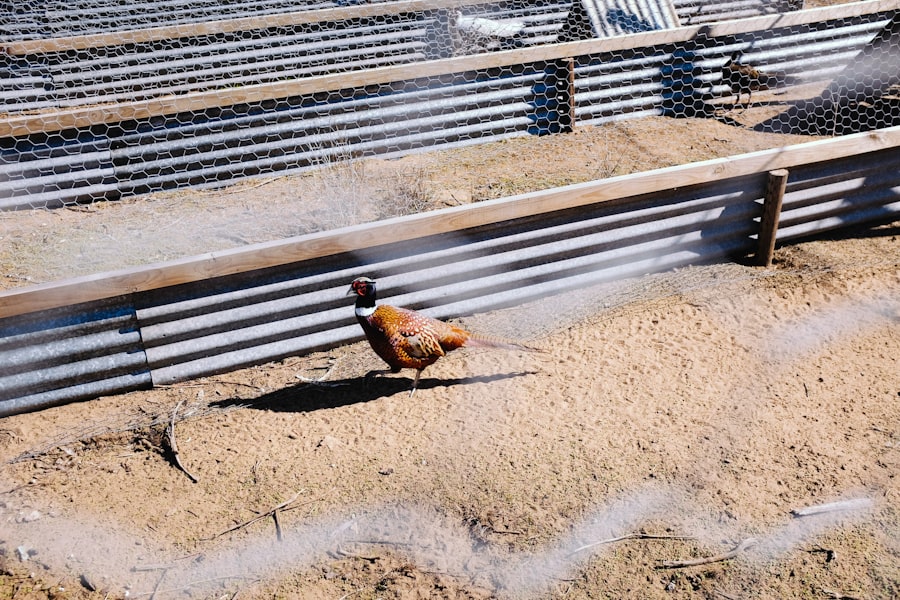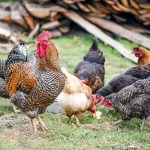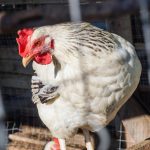Chickens are social creatures that thrive in flocks. They possess innate instincts to forage, scratch, and peck at the ground in search of food. Understanding these behaviors is essential for providing an appropriate environment.
Within a flock, chickens establish a hierarchical structure known as a pecking order, which can lead to aggressive behavior if not properly managed. Adequate space is crucial to allow chickens to establish their hierarchy without causing harm to one another. As diurnal animals, chickens are most active during daylight hours and require sufficient light for optimal health.
They also have a natural instinct to roost at night for safety and warmth, making it important to provide suitable roosting areas. Recognizing these behaviors helps create an environment conducive to their well-being. Understanding chicken behavior is also crucial for identifying signs of distress or illness, as chickens tend to conceal symptoms until severely unwell.
By being aware of their natural behaviors, chicken owners can provide appropriate care and attention to ensure the health and welfare of their flock.
Table of Contents
- 1 Providing adequate space and enrichment
- 2 Implementing barriers and deterrents
- 3 Using appropriate ground cover
- 4 Providing alternative digging areas
- 5 Supervising and training chickens
- 6 Seeking professional advice if necessary
- 7 FAQs
- 7.1 What are some reasons why chickens dig holes?
- 7.2 How can I prevent chickens from digging holes in my yard?
- 7.3 What are some methods for deterring chickens from digging holes?
- 7.4 Are there any specific breeds of chickens that are less likely to dig holes?
- 7.5 What are the potential risks of chickens digging holes in the yard?
Key Takeaways
- Chickens are social animals and exhibit natural behaviors such as scratching, dust bathing, and foraging.
- Providing adequate space and enrichment, such as perches and nesting boxes, is essential for the well-being of chickens.
- Implementing barriers and deterrents, such as fencing and predator-proofing coops, can help protect chickens from harm.
- Using appropriate ground cover, such as straw or wood shavings, can help maintain a clean and comfortable environment for chickens.
- Providing alternative digging areas, such as designated dust bathing spots, can help redirect chickens’ natural digging behavior away from undesirable areas.
- Supervising and training chickens can help manage their behavior and ensure their safety.
- Seeking professional advice, such as consulting with a veterinarian or experienced poultry keeper, can provide valuable guidance for addressing specific behavioral issues or concerns.
Providing adequate space and enrichment
Enrichment for a Happy Flock
Additionally, providing enrichment such as perches, dust baths, and hanging treats can help alleviate boredom and reduce aggressive behaviors within the flock. Enrichment activities also encourage natural behaviors such as scratching, pecking, and dust bathing, which are essential for the overall health and well-being of the chickens.
A Suitable Nesting Area for Egg-Laying Hens
In addition to space and enrichment, providing a suitable nesting area is crucial for egg-laying hens. Nesting boxes should be dark, quiet, and secluded to provide a safe and comfortable environment for laying eggs.
A Stimulating Environment for Happy and Healthy Chickens
Adequate space and enrichment not only contribute to the physical health of the chickens but also their mental well-being. By providing a stimulating environment, chicken owners can ensure that their flock remains happy and healthy.
Implementing barriers and deterrents
Implementing barriers and deterrents is essential in protecting chickens from predators and other potential threats. Fencing is one of the most effective ways to keep predators out of the chicken coop and run. Using hardware cloth with small openings is recommended to prevent predators from digging under or squeezing through the fence.
Additionally, adding an apron of wire mesh around the perimeter of the coop can deter predators from digging underneath the fence. It’s also important to secure all openings such as doors, windows, and vents to prevent predators from gaining access to the coop. In addition to fencing, using motion-activated lights or sound devices can help deter nocturnal predators such as raccoons and foxes.
These devices startle predators and discourage them from approaching the coop. Another effective deterrent is using predator scent repellents such as coyote or wolf urine around the perimeter of the coop. These scents mimic natural predators and can deter potential threats from approaching the area.
Implementing barriers and deterrents is crucial in ensuring the safety and security of the flock.
Using appropriate ground cover
Using appropriate ground cover in the outdoor run is essential for maintaining a clean and healthy environment for the chickens. Bare dirt can quickly turn into mud during rainy weather, leading to unsanitary conditions and potential health issues for the flock. Covering the ground with materials such as wood chips, straw, or sand can help absorb moisture and prevent mud from forming.
These materials also provide a comfortable surface for the chickens to walk on and engage in natural behaviors such as scratching and dust bathing. In addition to providing a clean environment, appropriate ground cover can also help in managing odor and waste buildup in the outdoor run. The ground cover acts as a natural absorbent, reducing the accumulation of droppings and preventing foul odors.
Regularly turning over the ground cover and adding fresh material as needed will help maintain a clean and hygienic outdoor run for the chickens. Using appropriate ground cover not only contributes to the physical health of the flock but also creates a more pleasant environment for both the chickens and their owners.
Providing alternative digging areas
Chickens have a natural instinct to scratch and dig at the ground in search of food and insects. Providing alternative digging areas in the outdoor run can help satisfy this natural behavior and prevent damage to garden beds or other areas of the property. Creating designated digging areas filled with loose soil or sand encourages chickens to engage in natural behaviors without causing destruction elsewhere.
These areas can be enriched with treats or mealworms to further encourage digging and scratching activities. In addition to providing alternative digging areas, offering a variety of natural materials such as logs, stumps, or rocks in the outdoor run can provide opportunities for exploration and enrichment. Chickens enjoy perching on logs or pecking at insects hiding underneath rocks, which helps stimulate their natural instincts and keeps them engaged.
Providing alternative digging areas not only satisfies their natural behaviors but also helps in managing their impact on the surrounding environment.
Supervising and training chickens

Early Detection and Intervention
Regular monitoring of the flock allows owners to catch any health issues early, which is vital in preventing them from becoming more severe.
Behavioral Management
Supervising the flock also provides an opportunity to monitor their behavior and interactions, enabling owners to address any aggressive or bullying behaviors within the flock. Training chickens to respond to cues such as coming when called or entering the coop at a specific time can be beneficial in managing their behavior and ensuring their safety.
Positive Reinforcement Techniques
Positive reinforcement techniques, such as using treats or rewards, can be used to train chickens to follow specific commands or routines. This approach helps to establish a bond between chicken owners and their flock, creating a more harmonious relationship based on trust and understanding.
Seeking professional advice if necessary
Seeking professional advice from a veterinarian or experienced poultry keeper is important when facing challenges or issues with chicken behavior or health. A professional can provide valuable insights and recommendations based on their expertise, helping chicken owners make informed decisions regarding the care and management of their flock. Consulting a veterinarian is crucial when dealing with health issues or concerns such as illness, injury, or disease within the flock.
Experienced poultry keepers can also offer practical advice and guidance based on their own experiences in managing chicken behavior and welfare. They can provide valuable tips on addressing specific behavioral issues or implementing effective management strategies for the flock. Seeking professional advice when necessary ensures that chicken owners have access to reliable information and support in caring for their flock.
In conclusion, understanding the behavior of chickens is essential in providing them with a suitable environment where they can thrive. Providing adequate space and enrichment, implementing barriers and deterrents, using appropriate ground cover, providing alternative digging areas, supervising and training chickens, and seeking professional advice when necessary are all important aspects of managing chicken behavior and welfare. By taking these factors into consideration, chicken owners can ensure that their flock remains healthy, happy, and well-cared for.
If you’re looking for ways to keep your chickens from digging holes in your yard, you may also be interested in learning about different types of chicken coops. Check out this article on A-Frame Chicken Coops for some helpful tips on providing a safe and comfortable living space for your feathered friends.
FAQs
What are some reasons why chickens dig holes?
Chickens dig holes for various reasons, including dust bathing, foraging for insects, and creating a comfortable spot to lay eggs.
How can I prevent chickens from digging holes in my yard?
To prevent chickens from digging holes in your yard, provide them with a designated dust bathing area, offer plenty of space for foraging, and provide adequate entertainment and enrichment to keep them occupied.
What are some methods for deterring chickens from digging holes?
Some methods for deterring chickens from digging holes include using chicken wire or hardware cloth to cover areas where they like to dig, providing distractions such as hanging treats or toys, and using deterrent sprays or scents.
Are there any specific breeds of chickens that are less likely to dig holes?
While all chickens have natural instincts to dig, some breeds may be less inclined to dig than others. Breeds known for their calm and docile nature, such as Buff Orpingtons or Silkies, may be less likely to dig holes in the yard.
What are the potential risks of chickens digging holes in the yard?
The potential risks of chickens digging holes in the yard include damage to landscaping, potential injury to the chickens from sharp objects or predators, and the creation of unsightly or hazardous areas in the yard.
Meet Walter, the feathered-friend fanatic of Florida! Nestled in the sunshine state, Walter struts through life with his feathered companions, clucking his way to happiness. With a coop that’s fancier than a five-star hotel, he’s the Don Juan of the chicken world. When he’s not teaching his hens to do the cha-cha, you’ll find him in a heated debate with his prized rooster, Sir Clucks-a-Lot. Walter’s poultry passion is no yolk; he’s the sunny-side-up guy you never knew you needed in your flock of friends!







